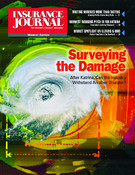Saying complimentary things about trial attorneys is not exactly the surest way to win friends in the insurance industry. Yet even in the heated debate over tort reform, it should be acceptable to acknowledge when the other side might have a valid point.
The American Trial Lawyers Association has fought attempts to end what the insurance industry and others claim is a crisis in the filing of frivolous lawsuits by consumers injured by faulty products, medical treatment or business practices. The industry maintains that these lawsuits are clogging the courts and driving up the cost of insurance, while trial attorneys argue there is no such crisis.
ATLA notes that the judiciary changes sought by the insurance industry and tort reformers restrict the rights of consumers to sue. But what about suits by businesses? Most tort reform advocates ignore the ridiculous lawsuits filed each year by businesses against each other. “Why should businesses have the courts to themselves?” ATLA rightly asks.
Among the “ridiculous” business suits cited on ATLA’s web site:
Fox News sued Al Franken for using the term “Fair and Balanced” on his book cover. The judge threw out the case, labeling it “wholly without merit, both factually and legally.”
In 1998, Enterprise Rent-A-Car sued Rent-A-Wreck of America and Hertz Corp. for using the phrase “pick you up,” claiming that “We’ll pick you up” is Enterprise’s slogan. Enterprise argued that the phrase means more than “we’ll give you a ride”; it means “we’ll pick up your spirits.”
Victoria’s Secret went all the way to the Supreme Court to catch Victor’s Little Secret, a shop selling sex toys in a strip mall in Elizabethtown, Ky. Victor Moseley named it Victor’s Secret after himself, but later changed the name to Victor’s Little Secret after Victoria’s Secret complained.
Mattel, Inc., the maker of Barbie, has been waging war against unsanctioned use of the Barbie name, attacking the founders of the “Barbie Makes a Wish,” which raises money for critically ill children; artist Paul Hansen, sued for $1.2 billion for making $2,000 from the sale of his Exorcist Barbie, Tonya Harding Barbie, and Drag Queen Barbie; and MCA Records Inc. for its song “Barbie Girl,” sung by a Danish group called Aqua. The song includes the lyrics, “I’m a blonde bimbo in a fantasy world/Dress me up, make it tight, I’m your dolly.”
In 1989 Walt Disney Company used a lawsuit to force a public apology from the Academy of Motion Picture Arts and Sciences for an “unflattering” representation of Snow White in the opening sequence of the 1989 Academy Awards ceremony.
The Foundation for Taxpayer and Consumer Rights, in its list of the top cases of corporate lawsuit abuse, cited a case in which Allstate sued Kraft Foods, the maker of the Toastette toaster pastry, and Pop-Tart creator Kellogg to avoid having to pay homeowners’ fire claims. Allstate claimed Kraft and Kellogg were responsible for the fires by making dangerous, flammable toaster pastries.
Also, Caterpillar sued the Walt Disney company for portraying bulldozers in a bad light. Caterpillar tried to block the release of “George of the Jungle 2,” claiming that the film gave the company a bad name because its machines are used to attack the jungle.
To the corporate executives who brought these suits, no doubt these matter were serious threats to their businesses. Or maybe a corporate lawyer convinced them they were.
Was this article valuable?
Here are more articles you may enjoy.


 Zurich Insurance’s Beazley Bid Sets the Stage for More Insurance Deals
Zurich Insurance’s Beazley Bid Sets the Stage for More Insurance Deals  Fire at Pennsylvania Hospital Forces Evacuation of Dozens of Patients
Fire at Pennsylvania Hospital Forces Evacuation of Dozens of Patients  AIG Underwriting Income Up 48% in Q4 on North America Commercial
AIG Underwriting Income Up 48% in Q4 on North America Commercial  Trump Demands $1 Billion From Harvard as Prolonged Standoff Appears to Deepen
Trump Demands $1 Billion From Harvard as Prolonged Standoff Appears to Deepen 


